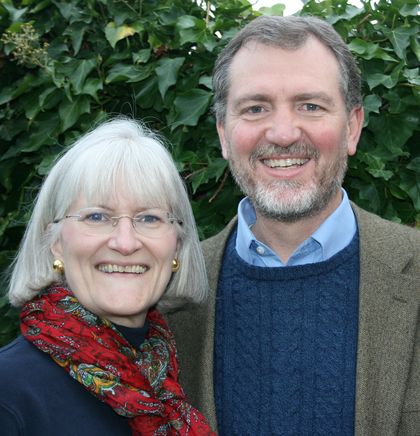“The main challenge is that non-evangelical Europeans feel that the gospel has been tried and found insufficient, that it is too simplistic for a complex and sophisticated society”, says American missionary Steve Mann after working in Europe for 30 years.
 Photo: Unsplash
Photo: Unsplash
Despite Europe's deep Christian tradition, secularism, economic, political, and social factors have made it into a land of mission. The crisis Europe is facing is also a great missionary opportunity.
Steve Mann, Association of Baptists for World Evangelism (ABWE) Regional Director for Western Europe, believes that “Europe is largely 'unconverted'”, but “there is still an opening for the Gospel.”
Mann, who has lived and worked as a missionary in Europe for more than 30 years, is convinced that “the complex problems of modern European life all find their solutions in deep, thoughtful application of the Gospel.”
He analyses the differences between American and European Christians, stating that, in general, “European evangelicals have a better understanding of relationships, and they see their Christianity as a relationship with God. This is something we, Americans, could learn.”
The ABWE director thinks that although “in missiological terms, Europe might be 'evangelized,' in terms of conversion it is one of the darkest continents.”
Read full interview with Steve Mann.
Question. What is ABWE?
Answer. The Letters stand for the Association of Baptists for World Evangelism. We are a North American evangelical mission started in 1927 by a medical doctor in the Philippines whose concern was that his mission wanted him to only do medical work and not to preach the Gospel.
Since then, our mission's focus has been gospel-centric. We currently have about 1,200 missionaries serving all over the world seeking to partner with local believers to stimulate church-planting movements and mission movements to God's glory.
Q. Is Europe a mission land? What is your vision for Europe?
A. In the mission community, the majority opinion is that Europe has been 'evangelized' (in the sense that the Gospel has been here for a long time). Admittedly, there are places in the world that still do not have the Gospel and we need to give every effort to reach them, but Europe is largely 'unconverted.'
Northern Protestant Europe is still only minutely evangelical (typically less than 3%). Southern Catholic Europe is even less so (less than 1%). So in missiological terms, it might be 'evangelized,' but in terms of conversion, it is one of the darkest continents. It is dark, but there is still an opening for the Gospel.
My vision for Europe, in short, is to see Europeans converted to Christ through the Gospel. I believe that intrinsic to the Gospel itself is the power and means for that to happen.
Beyond that, we want to see church-planting movements develop into missions movements. I believe this happens by discipling leaders.
 Steve Mann and his wife Caroline have served in Europe more than 30 years
Steve Mann and his wife Caroline have served in Europe more than 30 yearsQ. What are the main challenges for Christians and local churches in Europe today?
A. The main challenge is that non-evangelical Europeans feel that the Gospel has been tried and found insufficient, that the Gospel is too simplistic for a complex and sophisticated society.
Paul, in his day, had the same challenge. The Greeks considered the Gospel to be foolishness. Like Paul, we know that this dismissive attitude reveals more about the heart of the hearers than the Gospel. In fact, the Gospel is the wisdom of God.
The complex problems of modern European life all find their solutions in deep, thoughtful application of the Gospel. It is not that the Gospel has been tried and found insufficient, but that it has not been truly explored at all.
Let me illustrate: the refugee crisis is on the front of everyone's mind. Most people, when it comes to personal security, take a fight or flight approach, but the Gospel actually teaches us a different way. 'Love your enemies.' Why? Because when we were enemies, God loved us.
The New Testament encourages us toward hospitality (in Greek, literally, 'love for strangers/ foreigners'). When we love people, even people who are potentially our enemies, it does not make us more vulnerable. They actually appreciate that love and tend to reciprocate that love.
I'm not trying to comment on government policies, just that as Christians, we have had a valuable opportunity put on our doorstep. It is not the first time God has used the mass migration of people for His purposes.
I think that as Christians, we need to love our new neighbours. As always, obedience requires faith. Do I have enough to share? Probably not, but do I believe God will provide?
Q. Have you seen a growth in the gospel in Europe since you started your mission until today?
A. Yes. I am encouraged by what I am seeing. In France, the number of evangelicals has grown ten-fold in the last few years. It is still less than 1%, but a ten-fold increase anywhere is astounding.
In England, when I came 30 years ago, ministers fraternals were very discouraging. Today, young evangelical pastors are buzzing with talk of church-planting.
In Norway, God seems to be raising up young evangelicals with a zeal for the Scriptures and the Gospel. I am seeing movements like this all over Europe. There is still work to be done, but I believe there are signs that God is working.
Q. In your opinion, what are the main differences between European and American Christians and local churches? What can we learn from each other?
A. First, for the purpose of full disclosure, let me say that I am an American who has worked in Europe for 30 years. Second, my experience is limited by my experience. In other words, it is difficult to make broad statements about cultures without getting things wrong or misrepresenting people.
There are exceptions to what I am going to say. With those caveats in place, I would say that American Christians tend to be much more confident in their success, while European Christians tend to be much more confident in Christ.
What can we learn from each other? European Christians can learn that following Christ does not always mean small numbers (sometimes it does), meagre resources, and shoddy programmes. Since we serve God, our churches reflect on Him and His Person. Back-alley churches may be necessary at times, but I'm afraid evangelicals are often perceived as cults in Europe because we carry ourselves as social misfits.
We might be misfits in society, but we are heralding a message from the King of kings. It is an authoritative Gospel, not to be relegated to back-streets and alleys and not to be given that impression by our methods of presentation.
American Christians can learn lots of humility. I was in a conference earlier this week where 8 American missionaries were being interviewed on the topic of 'commitment.' As the evening progressed, I was beginning to become more and more discouraged. It was beginning to sound like hard work and grim determination were the keys to 'commitment.' It was making missionaries sound like heroes.
 Association of Baptists for World Evangelism (ABWE)
Association of Baptists for World Evangelism (ABWE)Finally, a young man said: 'I struggle with commitment every day, but my commitment is determined by the love of Christ. As I grow to understand His love, it makes me love Him more. That is what seals my commitment.' I wanted to stand up and cheer.
As North American missionaries, we often talk about the Gospel, but our lives often demonstrate a different gospel (one that is not good news). We talk about Christ being our Saviour, but functionally, we think we are the Saviour of the world.
We talk about grace, but live by our works. We live by grim-faced determination which contradicts our message of joy and peace in Christ. We act as if our standing before God is determined by our performance instead our relationship with Christ.
Generally, I believe European evangelicals have a better understanding of relationships, and they see their Christianity as a relationship with God. This something we Americans could learn.
Q. As Christians, How can we help ABWE´s missionary work in Europe and all around the world?
A. First, we would love to know people are praying for us. Living and working here has taught me the folly of not having God's blessing. Please pray for us. Second, we would love partner with those who are like-minded for the Gospel. Those interested can email me. Third, if a North American would like to serve with ABWE, they can go to our website
Q. Is there anything else you want to add?
A. I am just so grateful to God for allowing me to work in Europe for all these years. Recently, because of some family health issues, we have had to return to America, but I miss living there. I miss the fellowship of my brothers in Christ there. I miss our church fellowship there. I am so thankful for the many things my brothers in Europe taught me. Know that I am praying for God to work there.

Las opiniones vertidas por nuestros colaboradores se realizan a nivel personal, pudiendo coincidir o no con la postura de la dirección de Protestante Digital.
Si quieres comentar o